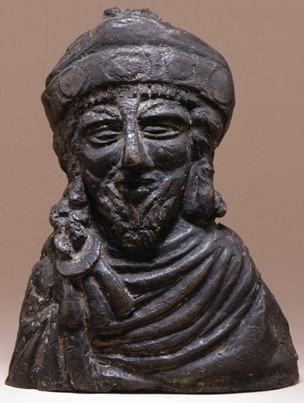Phocas was a mere brutal soldier—cruel, ignorant, suspicious, and reckless, and in his incapable hands the empire began to fall to pieces with alarming rapidity. He opened his reign with a series of cruel executions of his predecessor’s friends, and from that moment his deeds of bloodshed never ceased: probably the worst of them was the execution of Constantina, widow of Maurice and daughter of Tiberius II., whom he slew together with her three young daughters, lest their names might be used as the excuse for a conspiracy against him. But even greater horror seems to have been caused when he burnt alive the able general Narses*, who had won many laurels in the last Persian war. Narses had come up to the capital under safe conduct to clear himself from accusations of treason: so the Emperor not only devised a punishment which had never yet been heard of since the empire became Christian, but broke his own plighted oath.
*(Not the same Narses of Justinian’s time)
The moment that Phocas had mounted the throne, Chosroes of Persia declared war on him, using the hypocritical pretext that he wished to revenge Maurice, for whom he professed a warm personal friendship. This war was far different from the indecisive contests in the reigns of Justinian and Justin II. In two successive years the Persians burst into North Syria and ravaged it as far as the sea; but in the third they turned north and swept over the hitherto untouched provinces of Asia Minor. In 608 their main army penetrated across Cappadocia and Galatia right up to the gates of Chalcedon. The inhabitants of Constantinople could see the blazing villages across the water on the Asiatic shore—a sight as new as it was terrifying; for although Thrace had several times been harried to within sight of the city, no enemy had ever been seen in Bithynia.
Plot after plot was formed in the capital against Phocas, but he succeeded in putting them all down, and slew the conspirators with fearful tortures. For eight years his reign continued: Constantinople was full of executions; Asia was ravaged from sea to sea; the Thracian and Illyrian provinces were overrun more and more by the Slavs, now that the army of Europe had been transferred across the Bosphorus to make head against the Persians. Yet Phocas still held on to Constantinople: the creature of a military revolt himself, it was by a military revolt alone that he was destined to be overthrown.
Africa was the only portion of the Roman Empire which in the reign of Phocas was suffering neither from civil strife nor foreign invasion. It was well governed by the aged exarch Heraclius, who was so well liked in the province that the emperor had not dared to depose him. Urged by desperate entreaties from all parties in Constantinople to strike a blow against the tyrant, and deliver the empire from the yoke of a monster, Heraclius at last consented. He quietly got ready a fleet, which he placed under the orders of his son, who bore the same name as himself. This he despatched against Constantinople, while at the same time his nephew Nicetas led a large body of horse along the African shore to invade Egypt.

When Heraclius the younger arrived with his fleet at the Dardanelles, all the prominent citizens of Constantinople fled secretly to take refuge with him. As he neared the capital the troops of Phocas burst into mutiny: the tyrant’s fleet was scattered after a slight engagement, and the city threw open its gates. Phocas was seized in the palace by an official whom he had cruelly wronged, and brought aboard the galley of the conqueror. “Is it thus”, said Heraclius “ that you have governed the empire?”. “Will you govern it any better ?”, sneered the desperate usurper, Heraclius spurned him away with his foot, and the sailors hewed him to pieces on the deck.
Next day the patriarch and the senate hailed Heraclius as emperor, and he was duly crowned in St Sophia on October 5, A. I). 610.
(Source: “The Byzantine Empire”, by C. W. C. Oman)

Research-Selection for NovoScriptorium: Anastasius Philoponus

Leave a comment